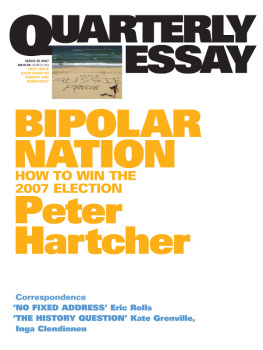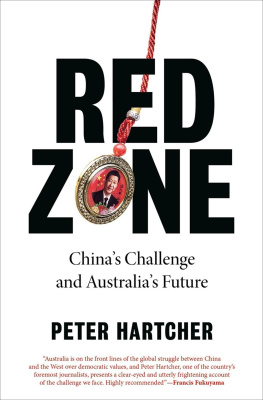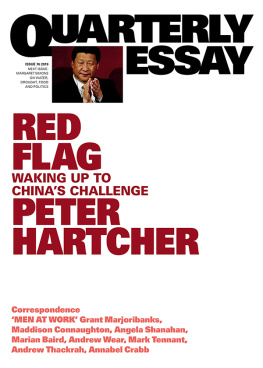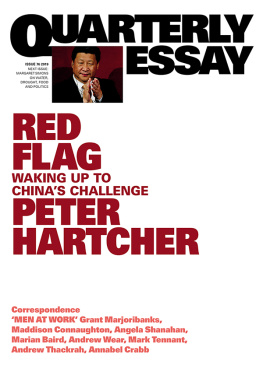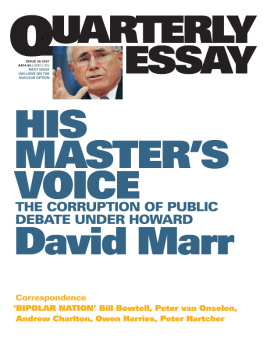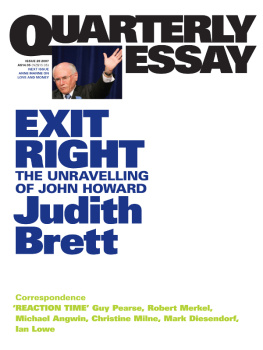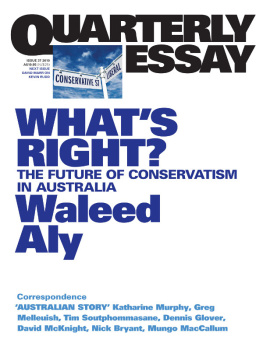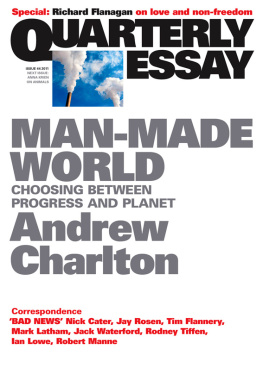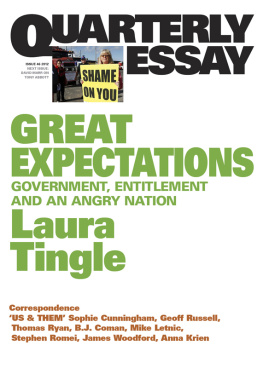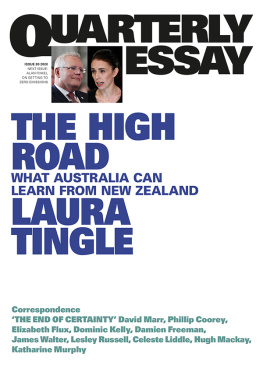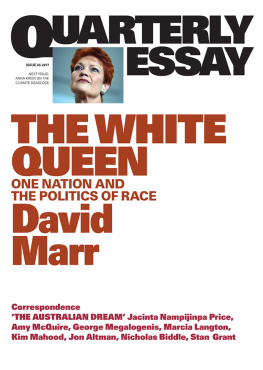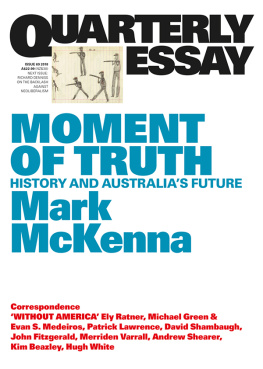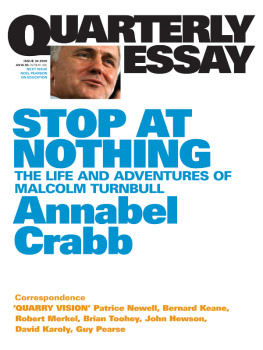Quarterly Essay is published four times a year by Black Inc., an imprint of Schwartz Publishing Pty Ltd. Publisher: Morry Schwartz.
ISBN 9781863954013 ISSN 1832-0953
ALL RIGHTS RESERVED.
No part of this publication may be reproduced, stored in a retrieval system, or transmitted in any form by any means electronic, mechanical, photocopying, recording or otherwise without the prior consent of the publishers.
Essay & correspondence retained by the authors.
Subscriptions (4 issues): $49 a year within Australia incl. GST (Institutional subs. $59). Outside Australia $79. Payment may be made by Mastercard, Visa or Bankcard, or by cheque made out to Schwartz Publishing. Payment includes postage and handling.
To subscribe, fill out and post the subscription card, or subscribe online at:
www.quarterlyessay.com
Correspondence and subscriptions should be addressed to the Editor at:
Black Inc.
Level 5, 289 Flinders Lane
Melbourne VIC 3000 Australia
Phone: 61 3 9654 2000
Fax: 61 3 9654 2290 Email:
quarterlyessay@blackincbooks.com (editorial)
subscribe@blackincbooks.com (subscriptions)
Editor: Chris Feik
Management: Sophy Williams
Production Co-ordinator: Caitlin Yates
Publicity: Anna Lensky
Design: Guy Mirabella
Printer: Griffin Press
BIPOLAR
NATION
How to Win the
2007 Election
Peter Hartcher
A type of market research called the projective technique, long applied in the consumer products field, is now coming to be used in politics. Its supposed to be a way of delving beneath consumers surface responses to get to their deeper, unarticulated feelings. They are asked to project their feelings for one thing onto another.
So, for example, in the prelude to the last US presidential election, market researchers asked Americans to think about their presidential candidates as cars. If George W. Bush were a car, what make would he be? The most common answer was that hed be a Ford. And his opponent, Senator John Kerry? Hed be a BMW.
What does it mean? A Ford is nothing glamorous. But it is genuine local product, familiar and reliable. A BMW is expensive and high-performance. But it is foreign, elitist and European. Suspiciously European. Its no surprise, on this analysis, that Bush went on to win the 2004 election.
In Australia, Tim Grau of the public-affairs consultancy Springboard conducted a similar exercise in 2005. He asked voters in focus groups to think of our national leaders as dogs. If John Howard were a dog, what breed would he be?
The most common answers were fox terrier, bulldog and Jack Russell terrier. What does this mean? Our research has consistently found that strong and successful political leaders are characterised by voters as worker dogs, reported Grau, the type you would have for protection or to do work around the home or property. They are small, agile and aggressive.
Asked the same question about Peter Costello, voters most commonly replied that hed be a labrador or cocker spaniel. These, said Grau, are the sorts of breeds you might like to play with in the backyard, but not the sorts of dogs you would trust to protect your house and family.
When it came to the former Opposition leader Kim Beazley, by far the most common reaction was Saint Bernard, followed by Great Dane. These breeds are supposed to be likeable and loyal; the bad news is that they are also seen as big, cuddly, slow and dopey not the types youd trust with the protection of the family home.
Although Grau once worked for the Labor Party, his findings carry a favourable implication for Howard voters see him as the ideal breed for leadership.
What about Kevin Rudd? He was not included in the exercise, conducted when he was merely a frontbencher. In early 2007, voters were still forming their impressions of the new Labor leader. Rudd has the qualities that he needs to emerge as a strong, viable alternative prime minister he is more terrier than labrador but the open question is whether the electorate will see him that way.
You only get one chance to make a first impression, and Rudd has used his well. Within three months of replacing Beazley, the new Opposition leaders approval rating was a very strong 60 per cent, double Beazleys terminal performance and a full twenty points ahead of Howards rating according to Newspoll. He had also lifted Labors share of the primary vote by a remarkable seven or eight percentage points and put it in a commanding position.
Rudd casts Australias choice as one between a stale government and a refreshed Labor Party; between a government of market fundamentalists and a Labor Party of social fairness; between a Prime Minister who runs the country on hour-by-hour political spin and a Labor leader of steady long-term purpose.
Rudd has drawn several constituencies. First are the disheartened voters who had drifted leftwards, away from Labor to the Greens and elsewhere. They have taken heart from Rudds ideological eloquence. Their hope in Labor has been rekindled by his clarity and idealism in setting out a social-democratic alternative to what Rudd has called Howards Brutopia.
This group of recovering Labor voters had given up on Beazley as just a windy reiteration of Howardism and they are intrigued by Rudds promise to be an alternative, not an echo. In a privatised era when it seems no one will defend the role of the state in society, Rudd is not afraid to say that the resources of the state should be mobilised in the systematic support of the vulnerable. He has argued strongly for more public investment in education as a key public good. And his own life story seems to tell us that he really means it. He has told of how his family was evicted from its tenant farm when his father died. And of how he was able to work his way from a poor start in rural Queensland into Australias diplomatic service thanks to Whitlams gift of free university education.
It must be said that Rudds articulate intellectualism titillates some on the left. When Howard gave his ideologically triumphant address to a Quadrant dinner in October last year celebrating the death of philo-communism and the struggle against political correctness, there was a quiescent silence from Beazley. It seemed there would be no reply from Labor until, a month later, Rudd published an intellectual response in TheMonthly. Ideas matter, a Rudd refrain, appeals to an educated elite which delights in seeing politics waged not only in sound-grabs but also as a contest of ideology.
Another group of voters from the political right is interested in his unapologetic Christianity and his critique of Howard from a conservative standpoint. Rudd accuses Howard of betraying the Liberals Menzian tradition and of crossing the line, going a bridge too far in pursuit of an extremist neo-liberal agenda, notably with his WorkChoices laws. Howard, says Rudd, has broken the social contract that has held Australia together for a century.
It is striking that the Australian political tradition he has chosen to champion in this cause is not that of any Labor leader, but that of the patrician Sir Robert Gordon Menzies, founder of the Liberal Party and John Howards declared hero. Rudd associates himself with Menzies responsible conservatism and social liberalism, portraying Howard as a traitor to the traditions of his own party. Rudd wants to drive a wedge between two planks of conservative thinking, characterising Howard as a neo-liberal, neo-conservative fundamentalist who has betrayed the social conservatism of the Menzian mainstream. Rudd will restore it and recover the middle ground.

